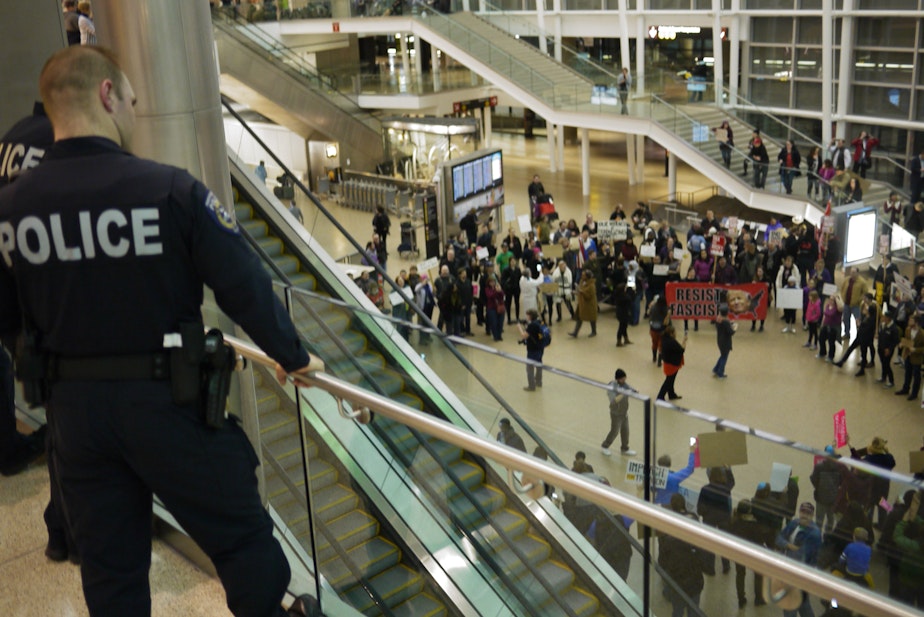The stroke of a pen signals hope and caution for Muslim Americans

On his first day in office, President Joe Biden signed 17 executive orders. One of them reversed the travel ban from several countries, many of them majority Muslim. It was first put into place by President Trump in January 2017.
By the end of the Trump administration, it covered residents of Iran, Yemen, Syria, Somalia, Libya, Sudan, Eritrea, and Nigeria, among others.
KUOW spoke to Karam Dana, an associate professor at the University of Washington Bothell and director of the American Muslim Research Institute, about the potential impact of President Biden's reversal of the travel ban, and the damage done to Muslim communities over the past four years.
T
here were families that lost their unification with other members of the family. I'm talking about spouses, husbands, wives, siblings, daughters, grandchildren, etc. There was more or less kind of a policy that broke families.
It's been very sad to kind of come to terms and to see the real impact on local communities. I mean, you've got kind of a vibrant Muslim community in the Seattle area, in particular from East Africa, from Eritrea, from Somalia, that has been directly impacted by this.
Sponsored
I've done focus groups in relation to this. Mostly, it's about people not being able to see their parents, people not being able to be unified, or reunified with their spouses. That's something very important because when we think about communities we think about families. If anything, it highlights a larger problem in American society, in my opinion, that Muslims have been targeted unfairly.
I think Muslim Americans, in particular, basically find themselves having to defend their Americanness, first of all, and then too, to actually try to convince their next-door neighbor that they are not terrorists, unfortunately. This is a bigger problem that we need to pay attention to, and to kind of understand the ramifications and of what happened four years ago during this Muslim ban.
The immediate impact [of Biden's reveral of the ban] is one that is symbolic, reversing the Trump administration's four years of a policy that discriminated against people's religious identity. However, in the long term, I feel that this is going to be felt, especially after the Covid-19 travel restrictions.
It will show not only our local community, or Americans who happen to be Muslim, but also the international community outside of the United States, that the U.S. is actually quite serious about taking care of its own citizens, and also treating them fairly. In addition to that, that targeting Muslims who live outside the United States is not something that the United States stands for.
Sponsored
I think this is a very important thing for the Biden administration, to start a new page in some ways, signaling to the Muslim American community and the global community that they are welcoming those who were not welcome during the Trump administration.
Am I optimistic? Absolutely. My biggest worry about 10 years or so ago was that this would become a partisan issue, whereby Republicans tend to push for policy that targets Muslims and where the democrats push for a policy that doesn't. Unfortunately, some of that has been realized during the Trump administration. Now, the Biden administration reverses some of that discrimination against Muslims.
Am I hopeful? Yes. Will this finish it, in the sense that discrimination against Muslim Americans will be done and over with in the next year or two? Absolutely not. It will take a lot longer than that. And it would require real genuine commitment from federal and local governments, in order for them to build the correct and appropriate partnerships with the American Muslim community to make sure that they are basically receiving the respect they deserve as American citizens and active participants in their own communities.
Listen to the interview by clicking the play button above.





